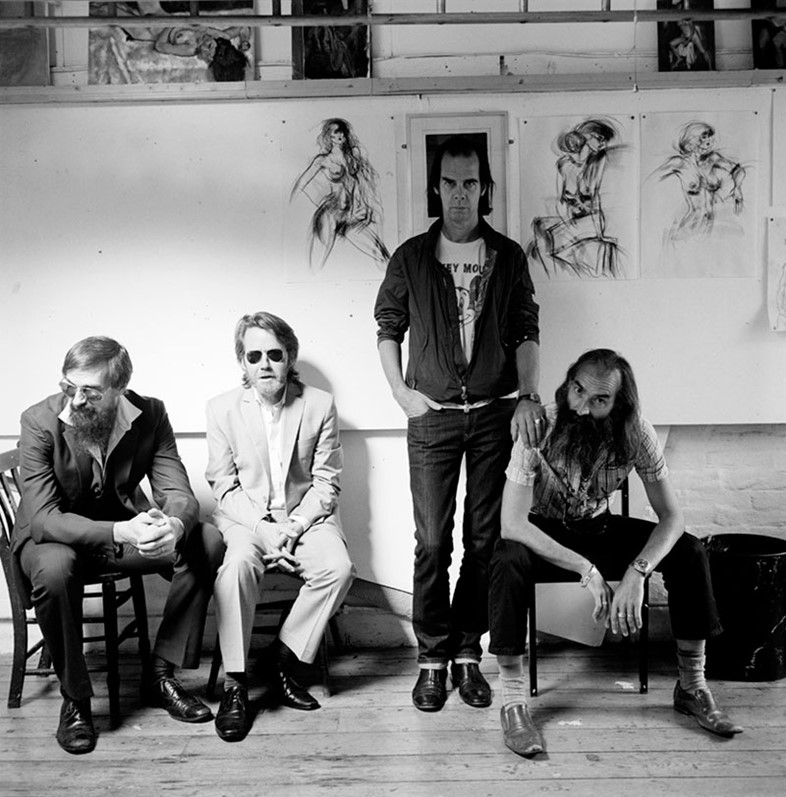If you are seeking a shot of some truly coruscating rock’n’roll medication then look no further than Grinderman
If you are seeking a shot in the arm of some truly coruscating rock'n'roll medication then look no further than Grinderman 2 – the second album from the stripped-down quartet of near-legendary musicians gleaned from The Bad Seeds. Nick Cave's second outing with the tight-knit Grinderman crew (Jim Sclavunos, Warren Ellis, Martyn Casey) witnesses the cohesion of last year's heavily-bearded, maraca-shaking collaborative sonic experiment into a lean, mean feedback-drenched machine that shoots planet-destroying lasers from its eyes (just check out John Hillcoat's video for tripped-out rocker ‘Heathen Child' if you don't take our word for it). In this exclusive interview and shoot for AnOther, John-Paul Pryor takes some time out of mind with the band to discuss mystical transcendence, surrealist songwriting and the sublime influence of rodents high on crystal meth...
AnOther: Lyrically, Grinderman 2 has a surreal quality that makes me think of Burroughs's cut-up technique – where does that come from?
Nick Cave: The narratives are abstract and atmospheric because I wanted to get away from the idea of a closed narrative. In a lot of The Bad Seeds' songs, I tell a story, and often the music's just bubbling away under that story. On some level that takes something away from the actual music. The more abstract the lyrics become, the more your ear listens to what's going on with the band. I mean, halfway through some of these songs you just give up trying to work out what the story is.
Warren Ellis: I think that comes from the way these songs have been formed too. In The Bad Seeds, Nick usually brings a song with the lyrics and then we work out what's the best thing to do with the song. In Grinderman, it feels like the approach is more balanced. This record goes further than the last one because we would go through the improvised sessions and choose to explore the moments that didn't feel familiar or comfortable: there's an element of risk involved that feels healthy.
Jim Sclavunos: It's not like Grinderman is better than The Bad Seeds, it's just a whole new band, and it's equally as satisfying – who knows what direction it is going to take now...
Nick Cave: There's something that goes on in Grinderman that has a kind of dream logic to it and I think that's really effective. I really love Heathen Child, for example, because I don't feel locked in by a narrative... I like it that the song takes a kind of U-turn at the end, and suddenly becomes about something quite scary.
AnOther: That balance of dread and the comedic definitely comes across in John Hillcoat's video for the track...
Nick Cave: John and I looked at the video in two ways – first comically, as a way to open up these things for people, and then we looked at bringing out this dark vein that runs through the whole thing. It was quite a balancing act to get that right. To me that's what Grinderman's very much about. It's trembling on a line and it can fall either way: into something really fucking terrible or into something that's really kind of inspired and exciting.
AnOther: Do you think rock'n'roll is at its best when it isn't too intellectual, but is more of a primitive Cramps-esque explosion?
Nick Cave: It can be all sorts of things, I reckon. That's the good thing about it. If you listen to the first Leonard Cohen record then that's both things: it seems to be torn out of him on the most basic level, but it's very much a considered piece of writing as well. I don't think that bands like The Cramps have defined what rock'n'roll should be about. It's just one version. I remember seeing my first Cramps gig, though, and it had a real effect on me.
AnOther: But what you are doing is pretty extreme in terms of rock'n'roll. It seems like you are the antidote to something like Lady Gaga...
Jim Sclavunos: Right on. You are 100 per cent correct. We are the antidote.
Nick Cave: For me, Grinderman has just totally opened up songwriting and it has affected The Bad Seeds in a really positive way. That's as far as it goes. The whole purpose of this for me is just to somehow work out a way to keep writing, and that comes from a sort of protestant duty I feel towards songwriting. That's much more interesting to me than bringing society to its knees and scaring the kids.
Warren Ellis: Musically, it feels like it has done that too though... That's what's great.
AnOther: How does getting older change your outlook as an artist? Are you more productive because of an increased awareness of mortality?
Nick Cave: I'm not sure there's a lot going for getting old. I mean, if anyone out there is thinking that they should give it a go, I would advise them against it.
Martyn Casey: (Laughs) It's not to do with a midlife crisis, it's just a life crisis.
Warren Ellis: Man, it just takes that long to learn how to play... I used to dream about being able to play like I'm playing now.
AnOther: There's a lot of sex and death in Grinderman though, isn't there? It's pretty much all sex and death...
Jim Sclavunos: ... mostly just death.
Warren Ellis: (Laughs) There's quite a lot of panic and anxiety in there too.
Martyn Casey: It's a lot like one of those rats in a maze that have been shot up with cocaine.
Warren Ellis: ... or a gerbil in a bag on crystal meth with its little teeth going gnik,gnik,gnik.
AnOther: (laughs) I suppose that's a good metaphor for Grinderman – a rodent trapped inside a condom on crystal meth...
Jim Sclavunos: ... it's not a metaphor.
Warren Ellis: (Laughs) It's actually where it all comes from. That's what we mean by improvisation. It's the ritual we partake of every night before we go onstage.
AnOther: (Laughs) On a different note, people in your position have a lot of stuff projected on to them in terms of identity. Do you think that any artist can avoid being seen as a cliché?
Jim Sclavunos: Well, it's not like you have a lot of control over it. I mean, there's always going to be someone out there that's going to pass your stuff off as something lesser or try to dismiss it.
Nick Cave: And there's always people who will use other people to elevate themselves in some way. I think that's often where the cliché thing is used the most. I mean, I've been called a cliché all my life. I am a fucking cliché.
Warren Ellis: The longer you're around, the more you get taken for granted...
Nick Cave: ... which is actually personally liberating: that on some level there's no point in trying to impress anyone any more. I think that the more that's happened, the closer the music I'm involved in has become the music that I actually listen to. For me, it's always important that there's an element of the divine in the writing process – what happens within my imaginative world doesn't apply in the same way in my personal world.
AnOther: Would you say music is the ultimate tool for transcendence?
Nick Cave: I think that there are all sorts of ways to do that. Music is one of them and it's an extremely effective one: it's quite rare that there are any experiences like that that don't incorporate music in some sense. Certainly, something happens on stage where you become somebody different – you become that person that you want to be.
Warren Ellis: That feeling's like a drug and it's really addictive. You don't get it all the time but when you do, it's like nothing else. For me, playing music is all about playing live... it's all about that moment.
Nick Cave: I think it's fair enough to say that there are things that we should be doing or that we shouldn't be doing. And when you're doing those things that you should be doing, you do get swept away, and it feels like the right thing. Time is different and you get lost in it – you transcend the mundane... and you float among the stars.
Grinderman 2 is out now on Mute Records
Credits
Photography: Johnnie Shand Kydd
Grooming: Jimo Salako for FordhamSoho
Music: Worm Tamer and Mickey Mouse by Grinderman



